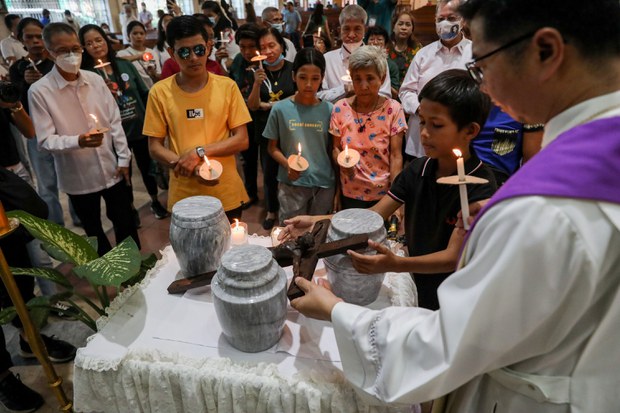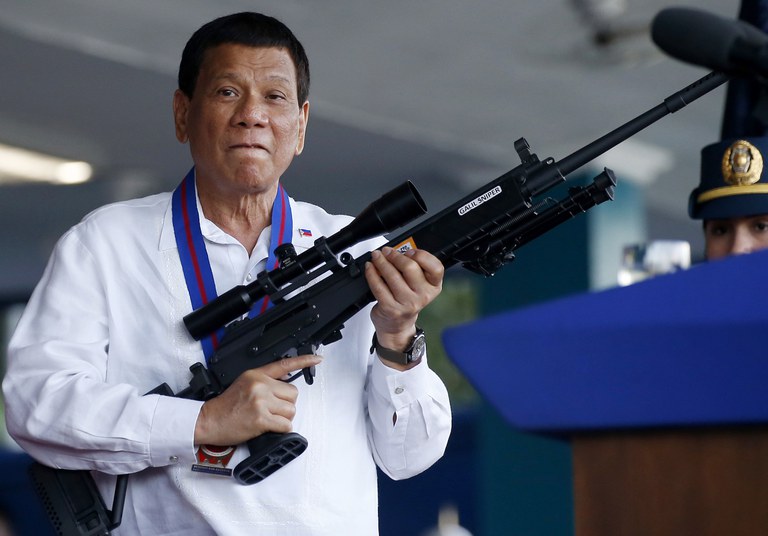Justice secretary: Philippines won’t honor ICC arrest warrants in drug-war probe
2023.07.17
Manila
 Relatives pray for urns containing the ashes of relatives killed in the Philippine government’s war on drugs, during a Catholic service in Caloocan city, Metro Manila, July 6, 2023.
Relatives pray for urns containing the ashes of relatives killed in the Philippine government’s war on drugs, during a Catholic service in Caloocan city, Metro Manila, July 6, 2023.
On the eve of an international court’s ruling on whether it will press on with investigating the former Philippine president’s war on drugs, the Marcos administration said Monday that it would not honor any related arrest warrants.
The Appeals Chamber of International Criminal Court (ICC), in The Hague, said it would rule July 18 on the Philippine government’s appeal to block the resumption of the ICC prosecutor’s probe into thousands of drug war killings under ex-President Rodrigo Duterte.
Should the court reject the appeal, the government would refuse to cooperate in executing warrants tied to the case, Justice Secretary Jesus Crispin Remulla said.
“No, they won’t do anything here. They have no involvement here. What will they do? Do they want to invade us again like a colony? That has long been over,” Remulla said in an interview with reporters on Monday.
“We were colonized by Spain, colonized by the United States, and colonized by Japan. Enough of that. Now, we are a free country with our own legal system,” he said.
A rejection would allow ICC Prosecutor Karim A.A. Khan to carry on with his probe into the drug war during Duterte’s presidency as well as extrajudicial killings by his so-called vigilante group, the Davao Death Squad, when Duterte served as the mayor of southern Davao city.
Khan could continue to gather evidence and request that ICC judges issue arrest warrants, according to the Human Rights Watch.
Among those who could be summoned are Duterte and his former national police chief, Sen. Ronald dela Rosa, who was the architect of the drug war during much of Duterte’s time in office (2016-22).
Citing previous ICC investigations in other countries, HRW noted that the time before warrants and summons might be issued could range “from a little less than two months to over six years.”
The ICC could seek to prosecute Filipinos if the appeals chamber rules against the Philippines, the state-run Philippine News Agency quoted Solicitor General Menardo Guevarra as saying on Sunday.
“There is no further appeal available to the Philippine government. Depending on the evidence we may be able to gather, the ICC prosecutor may seek the issuance of summonses or warrants of arrest against certain individuals,” Guevarra said.
“Regardless of the outcome of our appeal, the Philippine government will continue to focus on its own investigation and prosecution of alleged abuses in connection with the war on drugs. It will defend and assert the sovereignty of the Republic at all times.”

In 2018, Duterte withdrew the Philippines from the Rome Statute, the international treaty that created the ICC, and repeatedly said he would not allow himself to be subjected to an international trial.
Ferdinand Marcos Jr., winner of the 2022 presidential election who ran with the former president’s daughter, Sara Duterte – now the vice president – has called the ICC probe “a threat to our sovereignty.” Marcos so far has refused to allow the Philippines to rejoin the ICC.
Victims see no justice
Drug war victims and their families “unanimously and strongly” urged the ICC to continue investigations, saying justice remains “elusive” for them, according to a 20-page document made public. They cited an absence of proper documentation and genuine investigation, inaction under the new government, security concerns and fear of retaliation.
The document is part of the May 22 report published by the ICC Registry’s Victims Participation and Reparations section.
“In all communications received by the VPRS, victims unanimously support an ICC investigation into crimes against humanity allegedly committed in the context of the [war on drugs] in the Philippines between 1 November 2011 and 17 March 2019,” the report said.
“In the words of the victims, ‘justice and accountability in the Philippines remain largely elusive and victims and victims’ families face enormous difficulties in seeking accountability using available domestic legal remedies.’”
The victims, as cited in the report, also highlighted the prolongation of the drug war under the Marcos administration.
“In their submission, no investigations or prosecutions are being conducted into alleged war on drugs-related crimes committed under the former administration or the current one,” the report said.
“Moreover, victims report that … local authorities would mostly pressure victims’ families not to file cases,” it said.
More than 8,000 suspected drug addicts and dealers were killed during Duterte’s term as president, according to government figures. He once told police force members that he would protect them from prosecution if they were charged, as long as the deaths occurred while they were performing their mandate as law enforcement officers.







